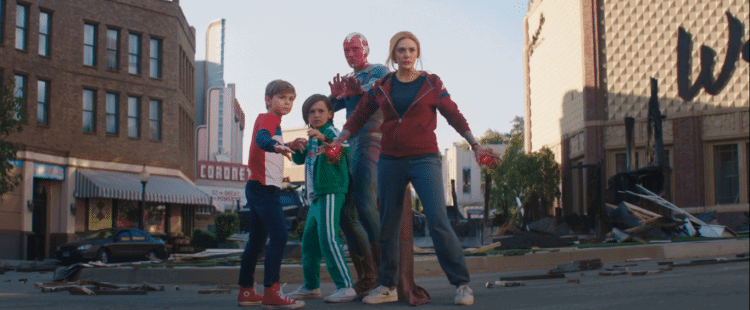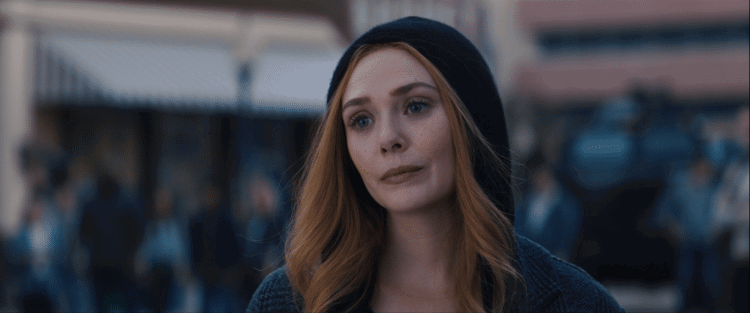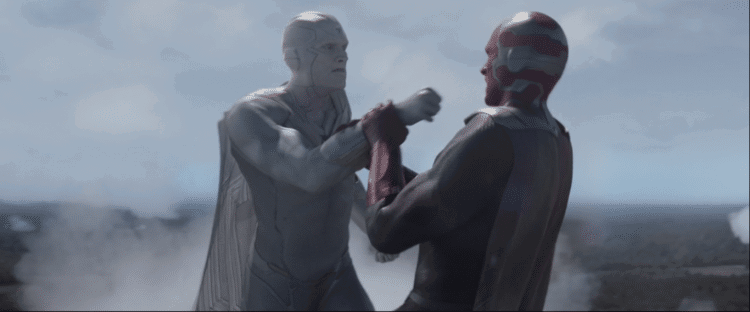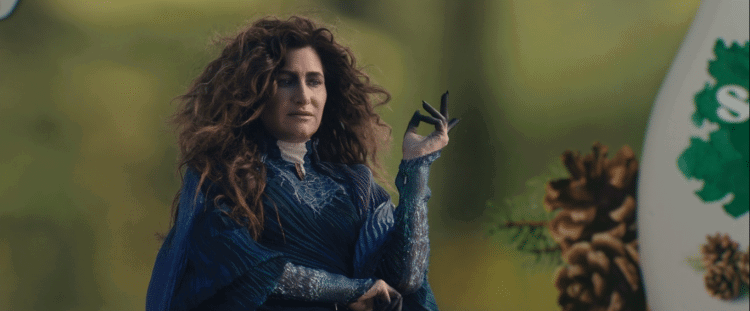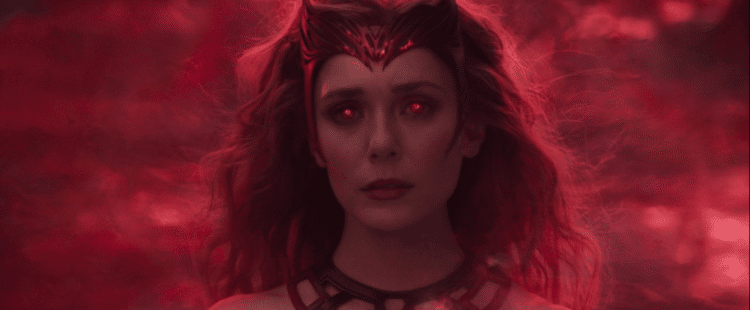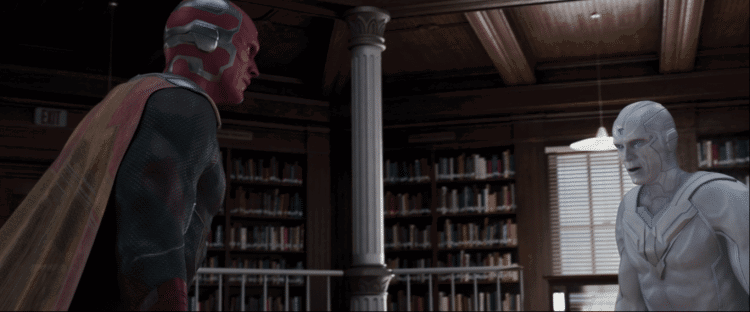On the surface, Wanda Maximoff and Tony Stark don’t have a lot in common. Tony inherited a fortune, became a superhero through science, and could never get enough of public adulation, while Wanda was born to a poor family, drew her powers from the inexplicable realm of magic, and continues to struggle with intense social anxiety.
Still, I’m reminded of Stark after WandaVision‘s enjoyable but not stellar conclusion. Like Tony, Wanda carries emotional baggage that makes her more human than her super-powered friends. Sadness plagues her story, and though it can never be fully conquered, she emerges from each battle against it as a better version of herself.
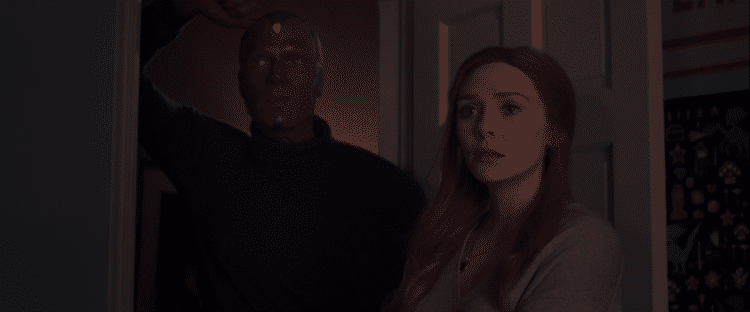
They now also share the honor of kicking off a new age of Marvel media. It wasn’t as flashy as Tony’s famous press conference, but Wanda gave the MCU direction by claiming her identity as the Scarlet Witch in “The Series Finale.” A whole new web of stories was unlocked by the episode’s end, which is an exciting or horrific prospect depending on where you fall in the media culture war. Instead of neatly wrapping all of its loose ends, WandaVision leaves viewers hungry for more Scarlet Witch, and the upcoming Dr. Strange and the Multiverse of Madness promises to deliver it.
If the finale was any indication, perhaps Marvel would be better off releasing a Scarlet Witch solo film. Elizabeth Olsen has mastered Wanda Maximoff and is poised to steal the spotlight from Cumberbatch’s Strange. She understands the character’s complex emotions and unique combat style. In earlier projects, her spellcasting sometimes looked like painful hand cramps, but now she slings them with fiery grace. When she rises to the sky to take on Agatha once and for all, she strikes a taunting pose and vanishes in a scarlet haze, delivering some much needed cool to a character with such stylish powers. She switches gears a few scenes later when the camera focuses on her glowing eyes after awakening her full power. Instead of the expected generic, badass superhero close up, she exudes a peaceful sorrow befitting the character’s journey.
If not for Olsen, WandaVision may very well have fallen apart. Its weaker episodes suffered from a lack of focus and conflicting identities that were held together by her performance, and those long standing problems led to shallow climaxes for much of the cast. No one had it worse than Monica Rambeau (Teyonah Parris), whose existence in WandaVision was purely to set up for Captain Marvel 2. She shows off her powers by taking bullets for Wanda’s imaginary children, and that’s her only contribution in the episode. It’s marginally more to work with than the three seconds given to Darcy Lewis (Kat Dennings), but it’s still a disservice to a character viewers spent so much time with.
Dissatisfying conclusions aren’t limited to Rambeau and Lewis. The finale had three separate storylines to resolve in 40 minutes, so inevitably one was going to be rushed. It happened to be the SWORD C-plot, with Jimmy Woo (Randall Park) and Director Hayward (Josh Stamberg) tasked with wrapping their arcs in as little time as possible. Hayward suffered for it the most. He had the potential to be one of the MCU’s more interesting villains, a man so scarred by the fallout from living in a world of superheroes that he seeks to eliminate them, but instead he’ll be remembered for getting hit by a truck and never being heard from again.
The Vision vs White Vision battle, while clearly the B-plot, thrived by subverting expectations in a creative WandaVision way. It’s hard to make an exciting Vision fight scene! He blasts a laser from his forehead, and that’s about the extent of his offensive kit. Showrunner Jac Schaeffer wisely turned the battle of foreheads into a logic puzzle just when the action was growing stale. Instead of overpowering his pale doppelganger, Vision exploits an oversight in his programming by discussing the Ship of Theseus thought experiment. Paul Bettany discussing philosophy with Paul Bettany is every bit as goofy as it sounds, but he sells it well. (White Vision’s contorted mouth deserves particular praise.) Instead of shouting “ERROR! ERROR!” and blowing up, White Vision regains memories from his previous life and flies away – a huge win for those not ready to say goodbye to him yet!
At the end of the day, however, WandaVision is really all about Wanda, and her final battle with Agatha, while exciting for Marvel’s future, felt more in line with traditional MCU climaxes than the experimental show that led to it. Grief isn’t something that you can overpower or outsmart, and it’s a far more interesting foe than Agatha Harkness. Ending such a cerebral story with a fireball duel, regardless of the superb choreography, is a bit of a letdown.
That’s not to say it’s terrible. Kathryn Hahn has been universally praised for her work as Agnes/Agatha, and she proved once again that she belongs near the top of any MCU best actors list. Not since Jeff Bridges’ Obadiah Stane has there been a villain who embraces the absurdity of the story as well as Hahn. She feels like something straight out of a comic book in the best way: wicked, dramatic, and fun. Hahn turns mediocre material into gold, and her foreshadowed return is more than welcome.
Unresolved threads like Agnes’ new life in suburbia and Wanda hearing her twins’ cries for help set the groundwork for Marvel stories to come, but “The Series Finale” would have been better served focusing more on WandaVision as a self-contained story rather than setup for the next big blockbuster. Wanda and Vision’s farewell suffers most from Marvel Studios prioritizing flexibility in its future over a completely satisfying resolution. It should have been the gut-wrenching emotional climax of the series – with Wanda getting a second chance to say goodbye, something mortals can never have – but instead it feels oddly happy. Vision all but promises he will return, and with White Vision out there the goodbye doesn’t feel like a goodbye at all.
Though wildly entertaining at times, “The Series Finale” feels incongruous with what came before by going light on emotion and heavy on action. That’s not the worst thing in the world, but Wanda Maximoff is the most emotionally interesting MCU character alive now that Tony Stark has bowed out. A story about sadness deserved a more poignant end than the one it received. Even so, WandaVision was a great first crack at bringing Marvel to streaming services. Falcon and the Winter Soldier has a high bar to hurdle.
WandaVision Finale Awards
MVP: Wanda Maximoff – It couldn’t be anyone else. Although “The Series Finale” went lighter than I’d hoped on emotion, Wanda emerges from the series as one of the most complex and interesting characters in Marvel’s arsenal. Her motivations are personal, stemming from a lifetime of pain, and not necessarily tied to the world’s greater good. With such incredible power – even stronger than The Sorcerer Supreme according to Agatha – she becomes a bit of a wildcard in the stories to come.
MVP Runner Up: The Ship of Theseus – This scene was so ridiculous, and I loved every second of it. In an episode packed with CGI explosions, it was nice to see Vision receive a climactic battle resolved without violence. That being said, the logic puzzle’s answer is pretty obvious: The ship rebuilt from the original material is the Ship of Theseus. How is a ship without any of the material that Theseus sailed on supposed to be his ship? It’s ridiculous! White Vision is the true Vision.
Rookie of the Year: Agatha Harkness – Agatha delivered some of WandaVision’s best scenes. Hahn is able to blur the line between comedy and drama, and that makes her incredibly charismatic. I’m still dealing with “Agatha All Along” occasionally popping into my head and wish we got a full sitcom-style episode devoted to the premise.
WandaVision Final Score: 4/5 – I won’t be writing The Outerhaven’s season review, but if I was, I’d give it a 4. WandaVision benefited and suffered from its place within the larger MCU, particularly when it came to its later sitcom spoofs. I’m still not over the missed opportunities in episode seven’s mockumentary, and the MCU lore dumps required for new viewers sidelined Vision for too long.
That said, the show’s emotional core largely resonated throughout, even if the finale kept things a little too positive for a story about sadness. Great performances from Olsen, Bettany and Hahn picked up the slack when the material wasn’t quite up to snuff, and their characters were all well developed. Most importantly though, WandaVision was creative. It took me back to pre-Age of Ultron Marvel, where solo movies had a unique style that fit their title characters.
If you’ve been following our reviews, thanks for joining me on this journey! We’re off next week, but back at it with Falcon and the Winter Soldier on the 19th!


